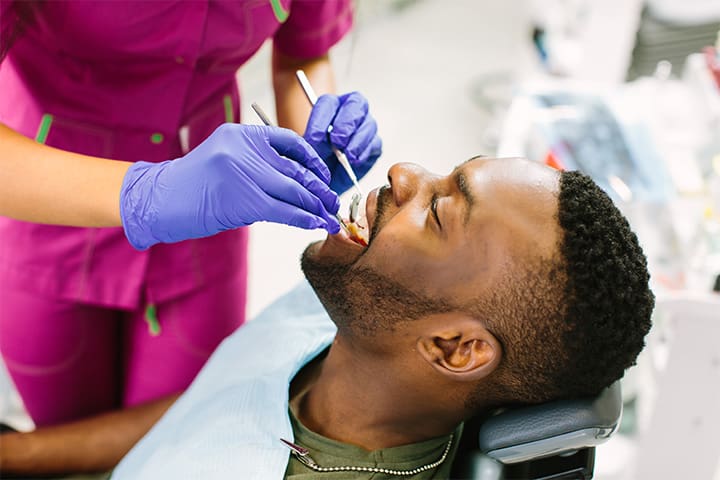Bringing Relief to Your Upset Smile
Like any other body part, your smile can suffer from severe health issues over time. These “dental emergencies” cause big oral problems when you don’t get fast care for them. Thankfully, your emergency dentist in Northampton will help you with urgent cases. All you need to do is call us – we’ll quickly see you and make sure your whole mouth heals. For further details, please read below or book your visit with us now!
Why Choose Northampton Dental Specialists Group for Emergency Dentistry?
- Trained Dentists with Decades of Experience
- Warm & Attentive Dental Team
- Dental Insurance Friendly
How We Treat Dental Emergencies

Honestly, you don’t need to panic over your dental emergency. Northampton Dental Specialists Group will explain what to expect from your treatment. The overall process will involve:
- A Near-Immediate Visit – Once you call, we’ll set your visit as soon as possible. Our team can also provide care tips over the phone while you wait.
- An Emergency Exam – Our dentists will perform a quick oral exam when you arrive for care. That way, we’ll grasp your problem and how to ease your pain.
- Review of Findings – After the exam, we’ll share our findings and suggest helpful procedures. We’ll also draft a treatment plan using your feedback, mentioning the relevant cost(s) and time before you commit.
- Proper Dental Care – When your treatment plan is ready, we’ll quickly repair your smile. You can trust that much due to our team’s great skill and experience! Whether it’s dental crowns, fillings, root canals, or something else, we’ll meet your mouth’s needs.
The Most Common Dental Emergencies
Certainly, your first move in a dental emergency should be to call us. We’ll quickly schedule your visit, solve the issue, and ensure your smile is healthy and thriving! Having said that, you can take steps to handle things yourself while you wait for care; doing so even makes treatment smoother. Learn the details by clicking one (or more) of the icons below and using the related instructions.
Toothaches
Chipped Tooth
Cracked Tooth
Sensitivity to Hot & Cold
Knocked-Out Tooth
Lost Filling or Crown
Broken Denture
Loose Tooth
Gums, Lips or Tongue Injury
Jaw Pain or Clenching
Something Stuck Between Teeth
Toothaches
Is my toothache a dental emergency?: Pain in your tooth should be considered an emergency if it’s severe, persists for more than a day, or is accompanied by symptoms of an infection such as swollen gum tissue. We recommend that you call our office right away; the sooner you can schedule an appointment, the sooner you can find relief and protect your smile from further harm.
How you should handle a toothache: Try flossing around the tooth in question. This will help get rid of any bits of food that might be causing your pain. If you’re still experiencing discomfort, you may take ibuprofen or a similar type of pain reliever. It may also be beneficial to rinse with salt water or apply a cold compress to any areas where swelling has occurred.
How we treat toothaches: The treatment for a toothache can vary depending on the underlying cause as well as the severity of the situation. Sometimes, a filling may be enough to resolve the issue. But in other cases, you might require a more complex service such as root canal treatment. We’ll do what we can to relieve your pain while also keeping your natural smile intact; however, we may need to extract your tooth if we find that it has reached the point of no return.
Learn More About Root Canal Treatment Learn More About Tooth Extractions Learn More About Gum Disease TreatmentChipped Tooth
Is a chipped tooth a dental emergency?: A chipped tooth doesn’t necessarily require immediate attention; it’s typically okay to wait a few days to see the dentist for treatment. That being said, failing to address the problem could result in worse damage, so don’t delay seeking care for too long.
How you should handle a chipped tooth: When eating, remember not to bite or chew with the side of your mouth where the affected tooth is located. On top of that, if the chipped tooth has a sharp edge that could irritate your soft oral tissues, you can cover it with a piece of dental wax.
How we treat chipped teeth: Oftentimes, a chipped tooth can be repaired with a simple dental bonding procedure. We can also cover the damage with a veneer; this approach is often recommended for teeth that are visible when you smile. Our team can go over the available treatment options in more detail once we’ve taken a look at the tooth and determined just how extensive the damage is.
Learn More About Dental Bonding Learn More About VeneersCracked Tooth
Is a cracked tooth a dental emergency?: In general, a cracked tooth should always be treated as an urgent issue that requires immediate attention from a dental expert. Even seemingly minor cracks can have serious consequences if left alone for too long, such as leaving the tooth susceptible to infection.
How you should handle a cracked tooth: You don’t want to make the damage worse, so you should avoid using the affected tooth to bite or chew. On top of that, it’s important to keep the tooth as clean as possible; make a point of rinsing your mouth with water at regular intervals. Sometimes a cracked tooth can cause discomfort, so take ibuprofen or another kind of over-the-counter pain reliever if you need to.
How we treat cracked teeth: We’ll evaluate the damage and determine the best way to repair it. Small cracks can sometimes be fixed with dental bonding, but more extensive damage could require a dental crown. In the event that the tooth is simply too badly damaged to restore, our team can gently extract it.
Learn More About Dental Bonding Learn More About Dental Crowns Learn More About Tooth ExtractionsVery Sensitive Teeth
Are very sensitive teeth a dental emergency?: Sensitive teeth are sometimes a side effect of advanced decay, gum recession, or another serious dental issue that requires swift treatment. We recommend that you call us right away for tooth sensitivity that is severe or lasts for multiple days in a row.
How you should handle sensitive teeth: Exposure to hot, cold, spicy, acidic, and sweet foods can aggravate sensitive teeth. Make a point of avoiding such foods for the time being, and remember to only drink lukewarm water. Depending on what other symptoms you’re experiencing, our team may give you additional first-aid advice when you call our office.
How we treat tooth sensitivity: We’ll identify the source of your tooth sensitivity and devise an appropriate treatment. For example, if you have a cavity, we can treat it with a filling. And if your teeth are becoming worn down due to bruxism (which causes you to grind your teeth at night), we can give you a nightguard to prevent further damage.
Learn More About Composite Fillings Learn More About Nightguards for Bruxism Learn More About Gum Disease Treatment Learn More About Root Canal TreatmentKnocked-Out Tooth
Is a knocked-out tooth a dental emergency?: A tooth that has been knocked out of your mouth won’t survive for very long. Thus, you have a very limited amount of time to try and have it reimplanted. To give yourself the best chance of saving your tooth, you should call us immediately and make arrangements to get to our office in less than an hour.
How you should handle a knocked-out tooth: When handling the tooth, remember to only touch the end that is used for chewing. Use water to rinse off any debris, but do not scrub the tooth, and don’t remove any tissues that might still be attached. It’s best to take steps to preserve the tooth for as long as possible. The ideal way to do this is to put the tooth back in its socket, but you can also place it in a container filled with milk or a saline solution.
How we treat knocked-out teeth: As long as the tooth is still viable, our team will take the necessary steps to save it. It’s often possible to reimplant it into the jaw so that it can bond with the surrounding tissue again. Not every tooth can be salvaged, however; in certain cases, it may be better to replace it with a dental implant, a dental bridge, or a partial denture.
Learn More About Dental Bridges Learn More About Dentures Learn More About Dental ImplantLost Filling or Crown
Is a lost filling or crown a dental emergency?: A tooth that has lost a filling or crown won’t be at immediate risk, but it shouldn’t remain unprotected for too long. It’s normal for an older filling or crown to fall out of the mouth; if this happens to you, please call our office as soon as possible to schedule an appointment.
How you should handle a lost filling or crown: Do not throw away the restoration. Instead, store it safely and bring it with you when you visit our office so that our team can take a look at it. If you have lost a dental crown, you may be able to temporarily reattach it to the tooth as long as it has not been too badly damaged; you can use over-the-counter dental cement or a dab of toothpaste as an adhesive.
How we treat lost fillings or crowns: We may need to replace your restoration if it has been completely lost or if it’s too old to use anymore. However, a newer filling or crown that hasn’t suffered severe damage can often be reattached to the tooth.
Learn More About Fillings Learn More About Dental CrownsBroken Denture
Is a broken denture a dental emergency? Yes, a broken denture is a dental emergency. Wearing a damaged prosthetic can injure your gums, soft tissues, jaws, and your remaining teeth. Whether the artificial teeth or the base of your dentures have been damaged, be sure to call us right away for help.
How to handle a broken denture: Never wear a broken denture, as this could injure your mouth or even cause the damage to the denture to get significantly worse. Let us take a closer look at the damage and either repair or replace it. Never attempt to repair dentures yourself with household products like superglue, as these are not biocompatible and could make you sick.
How we treat broken dentures: How we treat your broken denture will depend on the severity of the damage. Sometimes we can use composite resin to fill in a small chip or crack. In other cases, the denture may need a reline to fit properly. However, in cases of more severe damage we may need to fit you for a brand new denture if yours cannot be fixed. This may also be a great opportunity for you to consider switching to dental implants or implant dentures.
Learn More About Dentures Learn More About Dental Implants Learn More About Implant DenturesLoose Permanent Tooth
A loose permanent tooth can happen over time, or as the result of an accident or injury. If your tooth is loose, it is in danger of falling out, even if it doesn’t hurt.
How you should handle a loose permanent tooth: If you have a loose permanent tooth, it is important to contact us as soon as possible. Do not wiggle or play with your tooth with your fingers or tongue and avoid using it to chew. If the tooth has fallen completely out of your mouth, you can store it in a container of milk, saliva, or a tooth preservation kit, or you can keep it in the socket in your mouth or between your cheek and gums until you can be seen by your dentist.
How we treat loose permanent teeth: It may be possible to save your permanent tooth, however for best odds you should try to be treated within an hour of it falling out. If it cannot be saved, we may need to completely extract it. Once healed, your dentist can discuss options for replacement such as dental implants, a dental bridge, or dentures.
Learn More About Tooth Extractions Learn More About Dental Implants Learn More About Gum Disease Therapy Learn More About Sports MouthguardsInjury to the Gums, Lips, or Tongue
Is an injury to the gums, lips, or tongue a dental emergency? Yes. Cuts in your mouth can bleed quite a bit and be very alarming, but your dentist may be able to assist you with this dental emergency. These types of injuries can be quite common during sports.
How you should handle an injury to the gums, lips, or tongue: If you injure your mouth, gently cleanse the area with water to wash away any debris and bacteria. Apply pressure to the wound with a clean washcloth or piece of gauze until the bleeding stops. Then, apply an ice pack or cold compress over the area to help bring down any swelling and numb the pain.
How we treat injuries to the gums, lips, or tongue: If necessary, your dentist can stitch the wound closed and help keep the injury clean. However, if bleeding has still not stopped within ten minutes, please go to your local emergency room at once.
Learn More About Sports MouthguardsJaw Pain
Is jaw pain a dental emergency? Jaw pain can easily interfere with your daily life, and can eventually lead to serious oral health issues, making it a dental emergency.
How you should handle jaw pain: If you are suffering from jaw pain, please call us as soon as possible and we will give you specific instructions over the phone. You can generally take over-the-counter pain relievers and apply ice packs to ease any swelling and discomfort. However, if you’ve broken or dislocated your jaw, go directly to the emergency room. We’ll be happy to help repair your smile after you’ve been treated and released.
How we treat jaw pain: Bruxism treatments using a custom-made mouthguard can often help correct what’s causing your pain. Wisdom teeth are another common culprit. If they are impacted and causing discomfort, we can help extract them. If you need to go to the emergency room first, we’ll be here to help assist you fix any damaged or lost teeth once you’ve been discharged.
Learn More About Nightguards for Bruxism Learn More About Wisdom Tooth ExtractionSomething Stuck Between the Teeth
Getting food or debris caught between your teeth can be very uncomfortable. Never use things like tweezers, toothpicks, or any other sharp instrument to attempt to dislodge matter caught between the teeth. You could suddenly injure your soft tissues. Instead, try flossing and rinsing your mouth with water, dental floss, a water flosser, or floss pick first. If you still cannot dislodge the debris, give us a call and we’ll be happy to help.
Understanding the Cost of Emergency Dentistry

Not all dental emergencies are the same, so the cost of treating them varies. So, if you want an accurate estimate of the price, you’ll need to consult one of our dentists; they’ll narrow down your expenses. With all of that said, you can trust us to make your care as affordable as possible. Plus, you can read on to learn more about the topic in the meantime, including whether dental insurance providers typically cover a portion of the price.
Why Every Dental Emergency is Different

As we mentioned above, no two situations are exactly the same. In order to give you an accurate estimate of the price, we need to first consider the type of dental injury, the extent of the damage, and the restorative care needed. Then, we will need to consider factors like whether or not you have dental insurance. Rest assured, our team will be here to help every step of the way, so don’t hesitate to call us or book a consultation.
Does Dental Insurance Cover Dental Emergencies?

Do you have dental insurance? Whether it’s an individual plan or one through your employer, we have good news: your provider may cover a portion of the cost. In fact, many cover upwards of 80% of the cost of restorative care as well as one emergency exam annually. Since we’re an insurance-friendly practice, we can help you understand and utilize your benefits too! So, don’t hesitate to provide us with your membership information when you call to schedule an appointment or once you arrive at our office.
Other Options for Making Dental Emergencies Affordable

Don’t have dental insurance? Don’t let that stop you from getting the dental care you need! At our Northampton office, we also welcome flexible financing, which means that you don’t have to pay for the entire cost of your treatment in one lump sum. Instead, you can space out the cost into smaller chunks that fit into your monthly budget.
How Taking Care Of Your Smile Can Save You Money

Remember, taking the “wait and see” approach won’t save you money. In fact, it will likely cost you even more money because the root of the problem will only get worse if left untreated. That’s why we strongly recommend calling us when you first realize that something is wrong, like your gums are bleeding when you floss or you feel a sharp, stabbing pain when you bite down.
Taking great care of your smile will also save you money! So, if you aren’t already, start incorporating healthy habits into your daily routine (i.e., brushing twice a day, cutting back on added sugar, wearing a mouthguard during sports).
Keys to Preventing Dental Emergencies

While you can’t always keep dental emergencies from happening, you can reduce your risk of having one. The key is prioritizing prevention. More specifically, we recommend the following:
Brush Your Teeth Twice a Day

Brushing your teeth twice a day will help prevent tooth decay, gum disease, and other common oral health problems. So, make sure to use a soft-bristled toothbrush and toothpaste with fluoride to clean your teeth every morning and evening (and for two full minutes each time). Then, focus on adding other healthy habits into your routine, like flossing and rinsing with an ADA-approved mouthwash when you wake up.
Schedule a Dentist Visit Every Six Months

At your biannual visits, we cover a lot of ground – from screening for oral cancer to removing built-up plaque. We also examine the condition of your teeth, your gums, and any existing dental work, looking for warning signs of trouble in the process. If we notice anything, like a small cavity, we can treat it before it turns into a painful toothache. So, if it has been more than six months since your last checkup and cleaning, now is the time to get your appointment with our Northampton team on the calendar!
Stick to a Nutritious Diet

Eating healthy, well-balanced meals will benefit your oral and overall health. That’s why we encourage our patients to fill their plates with smile-friendly foods, like seasonal fruits and vegetables. It’s also a good idea to steer clear of extremely crunchy snacks, like hard pretzels, since they increase your risk of dental damage.
Tip: Drink lots of water throughout the day! This will help remove food particles from your teeth and prevent dry mouth.
Wear a Mouthguard During Sports

Wearing a mouthguard during sports is crucial (even non-contact ones). So, if you enjoy riding your bike, running, rollerblading, or lifting weights, make sure you wear yours! If you don’t have one, that’s okay – we can have a custom one made for you. Not only will this ensure that it fits comfortably, but it will also ensure that it’s the appropriate thickness for the activity.
Don’t Use Your Teeth as Tools

When the scissors aren’t within reach, you might be tempted to use your teeth to remove plastic wrapping. While that may seem harmless, using your teeth as tools significantly increases your risk of sustaining a serious dental injury. For this reason, we strongly advise against doing so. We also don’t recommend biting your nails, chewing on ice cubes, or smoking.
Dental Emergency FAQs
What does throbbing tooth pain mean?
Severe, throbbing dental pain is probably a symptom of infection or inflammation within the tooth. This problem is usually caused by cavities or cracks in the enamel allowing air and bacteria to make contact with the sensitive soft tissues inside the tooth. Throbbing dental pain can also be caused by severe decay that has not reached the pulp or the stress caused by chronic teeth grinding and clenching.
Tooth decay will not get better without the help of a qualified oral health professional such as Drs. Canby, Edwards, or Warren, and we can treat it with dental fillings, root canals, and restorations like crowns. We also offer customized nightguards that deliver superior protection against the damage caused by teeth grinding.
Will a toothache go away on its own?
A toothache caused by severe dental infection will not go away on its own unless the germs kill the nerve connecting the tooth to the brain. This will stop your brain from receiving pain signals from the tooth, but the infection will go on uninhibited and eventually cause tooth loss if not addressed.
To prevent this, it’s best to schedule an emergency dental appointment at Northampton Dental Specialists Group if your tooth pain lasts for more than a day. However, toothaches that are caused by inflammation of the gum tissue surrounding the tooth may go away on their own.
Can a chipped or cracked tooth repair on its own?
While dental enamel is the hardest material in the human body, it is not able to heal on its own. The dental structure lost to chips and cracks will not grow back, and this can leave the tooth vulnerable to infection and new injuries. While teeth can replace some of the minerals they lose to chemical exposure through the process of remineralization, this will not restore enamel that has already been destroyed.
The team at Northampton Dental Specialists Group is trained and equipped to repair cracks and chips in teeth with treatments like dental bonding and dental crowns.
Do I need to see my dentist if the chip or crack in my tooth is small?
Since enamel does not heal on its own, damaged teeth will only become more vulnerable to further injury and infection if they are not repaired. However, a minor chip or crack can usually wait a few days before receiving treatment. On the other hand, severe chips or cracks that leave the tooth with a jagged edge can lead to injuries to the soft tissues. Depending on the severity of the damage, we may recommend dental bonding, dental crowns, or another restorative treatment.






